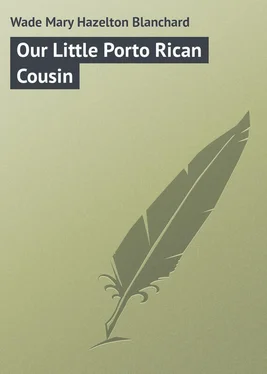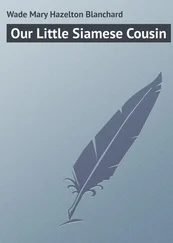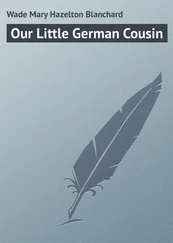Mary Wade - Our Little Porto Rican Cousin
Здесь есть возможность читать онлайн «Mary Wade - Our Little Porto Rican Cousin» — ознакомительный отрывок электронной книги совершенно бесплатно, а после прочтения отрывка купить полную версию. В некоторых случаях можно слушать аудио, скачать через торрент в формате fb2 и присутствует краткое содержание. Жанр: foreign_language, foreign_prose, на английском языке. Описание произведения, (предисловие) а так же отзывы посетителей доступны на портале библиотеки ЛибКат.
- Название:Our Little Porto Rican Cousin
- Автор:
- Жанр:
- Год:неизвестен
- ISBN:нет данных
- Рейтинг книги:4 / 5. Голосов: 1
-
Избранное:Добавить в избранное
- Отзывы:
-
Ваша оценка:
- 80
- 1
- 2
- 3
- 4
- 5
Our Little Porto Rican Cousin: краткое содержание, описание и аннотация
Предлагаем к чтению аннотацию, описание, краткое содержание или предисловие (зависит от того, что написал сам автор книги «Our Little Porto Rican Cousin»). Если вы не нашли необходимую информацию о книге — напишите в комментариях, мы постараемся отыскать её.
Our Little Porto Rican Cousin — читать онлайн ознакомительный отрывок
Ниже представлен текст книги, разбитый по страницам. Система сохранения места последней прочитанной страницы, позволяет с удобством читать онлайн бесплатно книгу «Our Little Porto Rican Cousin», без необходимости каждый раз заново искать на чём Вы остановились. Поставьте закладку, и сможете в любой момент перейти на страницу, на которой закончили чтение.
Интервал:
Закладка:
Mary Hazelton Wade
Our Little Porto Rican Cousin
Preface
The beautiful island of Porto Rico lies, as you will see by looking at the map, near that great open doorway to North America and the United States which we call the Gulf of Mexico. Very near it looks, does it not?
So the little cousin with whom we are going to become acquainted to-day is our near neighbour as well. To be sure, a schoolboy or girl from Massachusetts would have to travel a thousand miles or so to see his Porto Rican cousin; and even a child from Florida could not say good morning to his Porto Rican neighbour unless he were to take a sail of several hundred miles.
However, we, who are used to taking little excursions over the world (between the covers of a book), so that we may learn to know our tiny Eskimo cousins who live near the icy pole, and our little African cousins south of the equator, as well as our Japanese cousins on the other side of the globe, think nothing of the distance between here and Porto Rico. We should expect to feel very much at home after we arrived there, especially now that Porto Rico has become part of our own country.
We shall find our Porto Rican cousins and neighbours, with their dark skins, black hair, and soft black eyes, somewhat different in appearance, indeed, from ourselves; and we shall not be able to understand what they say unless we have learned the Spanish language; for, as we know, the parents or forefathers of our Porto Rican cousins came from Spain to Porto Rico, just as the parents and forefathers of most of us who speak English came from England.
However, these are slight differences; and the Spanish people, from whom our black-eyed Porto Rican cousin is descended, belong to the same branch of the great human family as we do, who are descended, most of us, from English people. That is, the Spanish people and their descendants, the Porto Ricans, belong to the white race. Manuel is thus a nearer relative than the little black cousin, who belongs to the negro race; or the little Japanese cousin, who belongs to the yellow or Mongolian race; or the little Indian cousin, who belongs to the red race; or the little Malayan cousin, who belongs to the brown race. So we shall welcome the Porto Rican neighbours near our doorway into our nation's family. They were already our cousins by descent; they have become our adopted brothers in our nation.
CHAPTER I.
MANUEL
It is a beautiful May day. The air is still, yet clear; the sun is shining brightly, but it is not too warm for comfort. There is not a cloud in the sky.
And yet lazy little Manuel lies curled up in his comfortable bed, sound asleep at eight o'clock in the morning. See! A smile lights up his face. Perhaps he is dreaming of his newly adopted American brothers.
Of the things he has read about, he longs to see a real New England snow-storm most of all. To built a snow fort, to make balls of snow and have a mock battle, what fun it must be! To slide down the icy hills, to ride over the snowy roads to the jingle of the sleigh-bells, – surely there is nothing in his island home to equal sport like that. And so in his dreams our little Manuel takes part in games he cannot play while awake, until they at last become quite real to him.
But now the door opens, and old black Juana, Manuel's nurse ever since he was born, comes softly into the dark room, bringing a tray in her hand. She steps toward a little stand beside the bed, and sets down the tray. Then she goes to the casement and opens wide the wooden shutter. The sunlight pours into the room, and Manuel slowly opens his big black eyes.
"Oh, it is you, mammy dear, is it?" he says, sleepily, and slowly stretches himself and sits up in bed.
Juana brings a basin of fresh water and a towel for the boy to bathe his hands and face, then draws the stand closer to his side and hands him a cup of steaming chocolate and a roll. What thick, rich chocolate it is, and what a dainty little roll! This is all the boy ever cares to eat in the morning, for he is seldom hungry when first roused. His father and mother are having coffee in their own bedroom at the same time Manuel is drinking his chocolate. This is the way every one in the family takes the first meal of the day.
Manuel is a creole. Many, many years ago his great-great-great (indeed I cannot tell you how many times great) grandfather left Spain and crossed the wide Atlantic Ocean. He came to this beautiful island of Porto Rico to live, and his children and grandchildren liked the place so well they never cared to go back to the mother country. Such people are called creoles; that is, people born in the West Indies of European parents. They set out great plantations of tobacco and sugar and became very rich.
Manuel's father has many acres of their land still, but the fortune of the family has been slowly lost; and, although there are many servants, and a large, comfortable home, there is not much money to spend.
The house is at least a hundred years old. It is made of blocks of stone, built around the four sides of a square courtyard, where orange-trees and magnolias stand in immense pots. A fountain is playing in the centre of the paved yard and making soft music as the spray falls upon the stones. There is a large aquarium at one side, where Manuel's mother cares for many beautiful fishes.
Vines climb up over the wide verandas; the stone work is nearly hidden by mosses which have made their home here; and, over all, the tall, graceful trees of the tropics sway gently to and fro.
There are water-lemon and banana, cocoanut and tamarind trees growing close to the house, and underneath in the rose-bushes and acacias hundreds of brilliant humming-birds are glancing in and out.
At first thought, it may seem strange to us that there are no windows fitted with glass in this old mansion. Our window is an opening in the wall of a building to let in or keep out light and air, as needed. In Porto Rico, where it is summer all the time, people need to have all the air possible in the house; they have no use for panes of glass such as we use. These are rarely seen anywhere in the island, but instead of them bars of iron are fastened across the casements, or else there are wooden shutters, as in Manuel's home. The slats of these shutters can be set open as much as one likes, or closed tightly when the heavy rains come.
When Manuel has finished drinking his chocolate, old Juana prepares a bath for him. She does not bring any soap, for his mother believes it spoils the skin; but the bath is scented with Florida-water, and the sweet perfume fills the room.
Manuel is soon dressed, for he wears only a little shirt and loose white trousers during the daytime at home. His feet are left bare, so he may be as cool as possible.
What a handsome fellow he is now that he is wide awake! He is a little smaller than his American brothers of his own age, but he is well-shaped and graceful. People say he looks very much like his beautiful mother. His black eyes are tender and loving, his hair is black, but fine and soft; his skin is dark, yet clear; and his teeth are even and white. Yes, he is not only good-looking, but kind and lovable, we feel sure.
CHAPTER II.
DOLORES
And now he goes from his room out into the courtyard, for the house is only one story high. His sister Dolores is there already, and runs to kiss him good morning.
"Oh, Dolores," says Manuel, "do you think we have time before our lessons begin to go over to Salvador's and see if he got those fireflies yet? He was to bring them to me last night."
"It's only nine o'clock now, we have an hour yet," answers Dolores, in her sweet voice. "I'm all ready, so let's go."
Both children put on their broad white hats and take a shady path through the fields. They soon reach the huts of the coloured workmen, clustered together in a grove of pimento-trees. A "pimento-walk" such a grove is sometimes called, and it would be hard to find anything more beautiful. The trees are of nearly the same height, reaching up about thirty feet from the ground. The branches are covered with glossy green leaves. The berries are not yet ready to pick, but when they are still green the coloured boys on the place must climb the trees and break off the twigs; they will throw them down to their sisters on the ground, who will pick off the berries and store them in bags for their master to send to the United States mainland. We call these berries "allspice," and after they have been dried we buy them under that name.
Читать дальшеИнтервал:
Закладка:
Похожие книги на «Our Little Porto Rican Cousin»
Представляем Вашему вниманию похожие книги на «Our Little Porto Rican Cousin» списком для выбора. Мы отобрали схожую по названию и смыслу литературу в надежде предоставить читателям больше вариантов отыскать новые, интересные, ещё непрочитанные произведения.
Обсуждение, отзывы о книге «Our Little Porto Rican Cousin» и просто собственные мнения читателей. Оставьте ваши комментарии, напишите, что Вы думаете о произведении, его смысле или главных героях. Укажите что конкретно понравилось, а что нет, и почему Вы так считаете.












